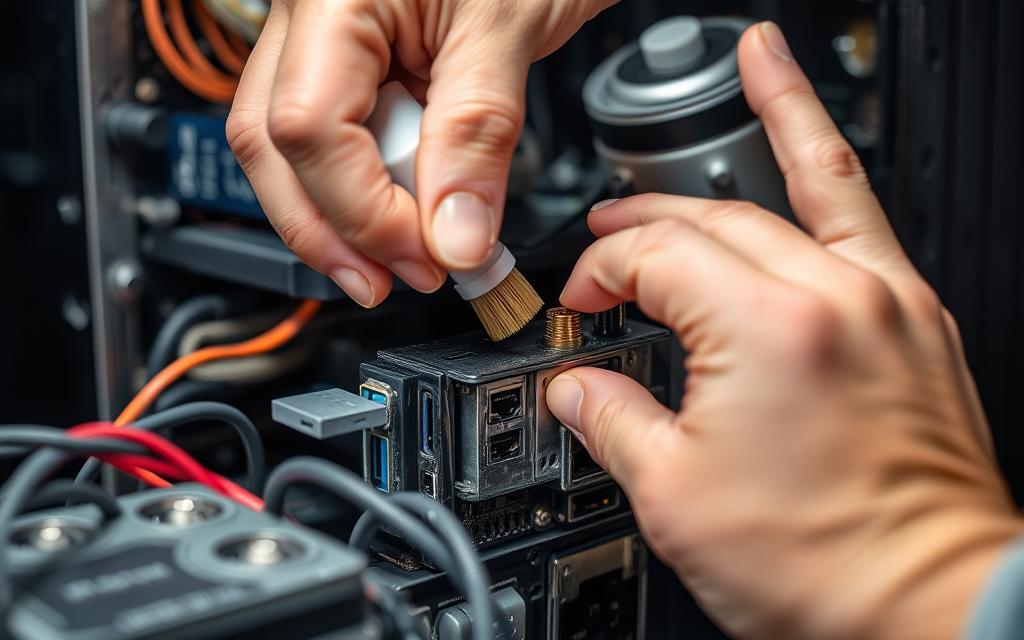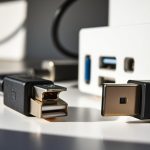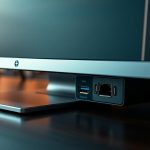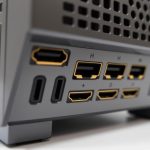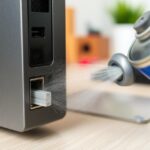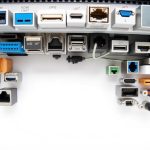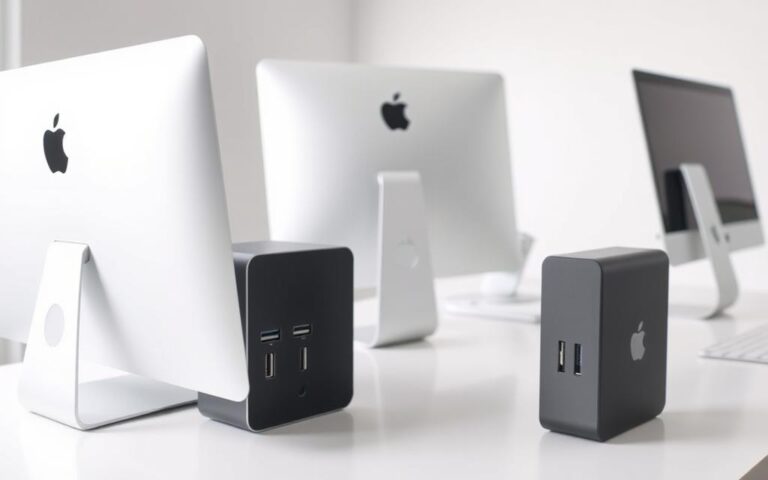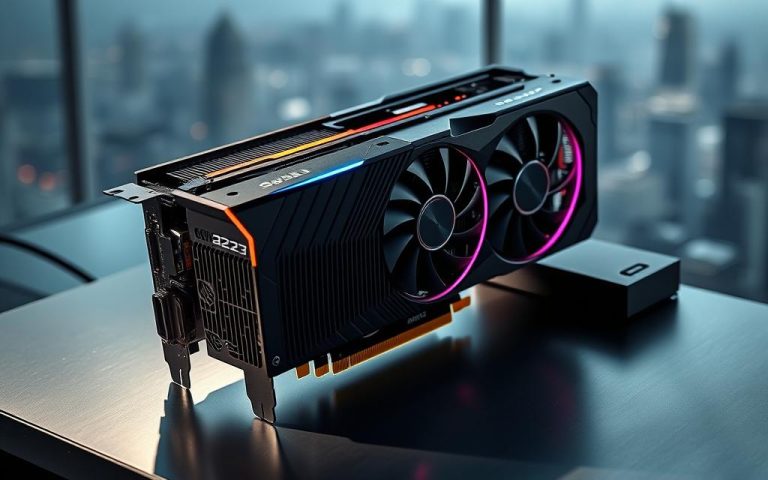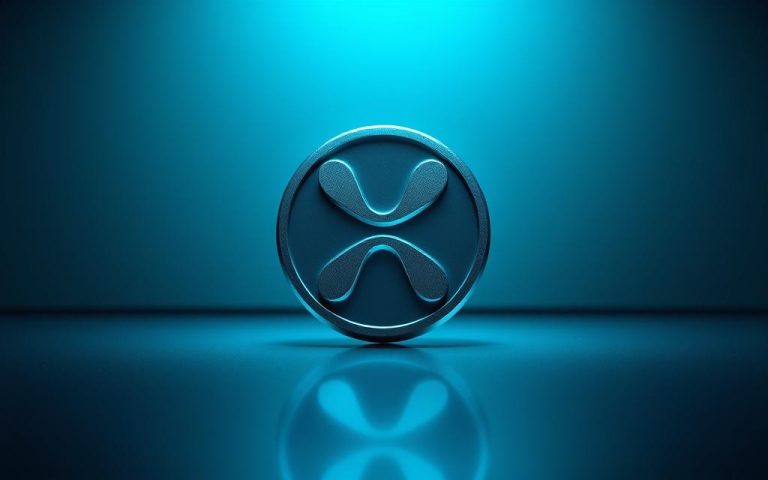Guide to Cleaning Computer Ports Effectively
To keep your devices working their best, it’s vital to clean computer ports well. Nowadays, devices like workstations and gaming PCs have many connectors like USB, VGA, and HDMI ports. These ports are key for the device to work right, but they can get clogged with dust and bits of stuff. This can lead to problems.
This guide will show you the right way to clean computer ports. We’ll talk about the issues that dirty ports can cause and share some handy cleaning tips. Taking care of these parts is important to keep your device safe inside, avoid harm, and make it last longer. For anyone using a PC, laptop, or phone, learning how to clean computer ports and keeping them clean is a must. This helps keep your tech in top shape.
Understanding Computer Ports
Computer ports are the entryways for hooking up various devices, crucial for their operation. Knowing the types of computer ports helps in keeping them running smoothly. Among them, USB and HDMI ports stand out. They cater to different demands ranging from transferring data to delivering high-definition sound and picture.
Types of Computer Ports
In the computer ports world, you’ll find several types, such as:
- USB Ports: These are common in today’s computers. They let you connect gadgets like printers, keyboards, and external storage.
- HDMI Ports: These are key for sending audio and video to screens. They’re crucial for enjoying movies and games.
- Types of virtual ports: For internet communication, things like TCP/IP are used. They help devices talk over the web.
Importance of Keeping Ports Clean
The importance of cleaning ports is huge. Dirt and small particles pile up in these connectors, which might lead to trouble. Not cleaning them can hurt performance and even damage your device. Keeping ports clean cuts down on repair costs and makes sure your gadgets work well. It’s wise to clean USB and HDMI ports often to prevent problems.
| Port Type | Function | Cleaning Recommendation |
|---|---|---|
| USB Ports | Connects peripherals | Use compressed air to clear debris |
| HDMI Ports | Transmits audio/video signals | Wipe with a soft cloth |
| Virtual Ports | Network usage | Regularly monitor for efficiency |
Common Issues Caused by Dirty Ports
Keeping ports clean is essential for your devices to work well. Dirty ports can cause major problems, affecting connectivity and how things work. USB-C ports on phones are especially prone to gathering dust and dirt.
This buildup can stop connectors from fitting right, harming how devices operate. It’s important to keep them clean for everything to work smoothly.
Impact on Device Functionality
Dirt and debris in ports can lead to device issues. For example, if a USB-C port isn’t working right or a cable won’t fit, it’s time to clean. Neglecting this can mess with charging, internet, and data transfer.
Unclean ports can cause physical damage, like blockages and corrosion. This can lead to more serious problems with how your device works.
Signs Your Ports Need Cleaning
Knowing when to clean your ports can help avoid trouble. Look out for:
- Visible dirt around the port entrance.
- Having a hard time connecting cables or devices.
- Devices connect off and on.
Cleaning your ports quickly can make your devices run better and last longer. It keeps them working right and stops damage from dirty ports.
How to Clean Computer Ports
Cleaning computer ports is crucial for keeping them working well. First, make sure your computer is off and not plugged in. This helps you see the dust and dirt more clearly.
Preparation for Cleaning
To get ready for cleaning, here’s what you should do:
- Switch off your computer to prevent any damage.
- Disconnect everything so you can get to the ports easily.
- Make sure you have good light to spot all the dirt.
Step-by-Step Cleaning Techniques
Use these methods to clean your ports:
- Blast dust away with compressed air from a few inches away.
- For tough dirt, a slightly wet cotton swab with alcohol works well. Alcohol dries fast so it won’t leave moisture behind.
- Use a soft brush to clear out any dirt. Be careful not to push the dirt in further.
- If you still see dirt after trying these, you might need an expert’s help.
Materials You Will Need
Here are the things you need for cleaning:
| Material | Purpose |
|---|---|
| Compressed air | For dusting ports without touching |
| Cotton swabs | Helps clean small, tight areas |
| Soft cloth | Gentle wiping of surfaces |
| Isopropyl alcohol | Cleans and disinfects hard grime |
Using Compressed Air for Cleaning
Compressed air is vital for keeping computer parts clean, especially through compressed air cleaning. It blasts away dust from areas hard to reach. Knowing the benefits of compressed air can make your equipment work better and last longer.
Benefits of Compressed Air
The merits of using compressed air for cleaning are many. It safely removes dust without touching sensitive parts. It reaches spots that usual cleaning tools can’t. Using it often keeps devices from overheating by keeping vents clear. This helps your gear perform well. For tips on keeping your computer clean, see this detailed guide.
Proper Technique for Using Compressed Air
To use compressed air right, be sure to maintain a safe distance. Keep the can 1–3 inches away from your device. This prevents harm to delicate parts. Blow short air bursts to avoid pushing dirt in further.
When cleaning ports, look for any blockages. Tilt the nozzle lightly to move the air correctly. Doing this will stop dust from getting into sensitive spots. Clean your devices every few months to keep them working well and damage-free.
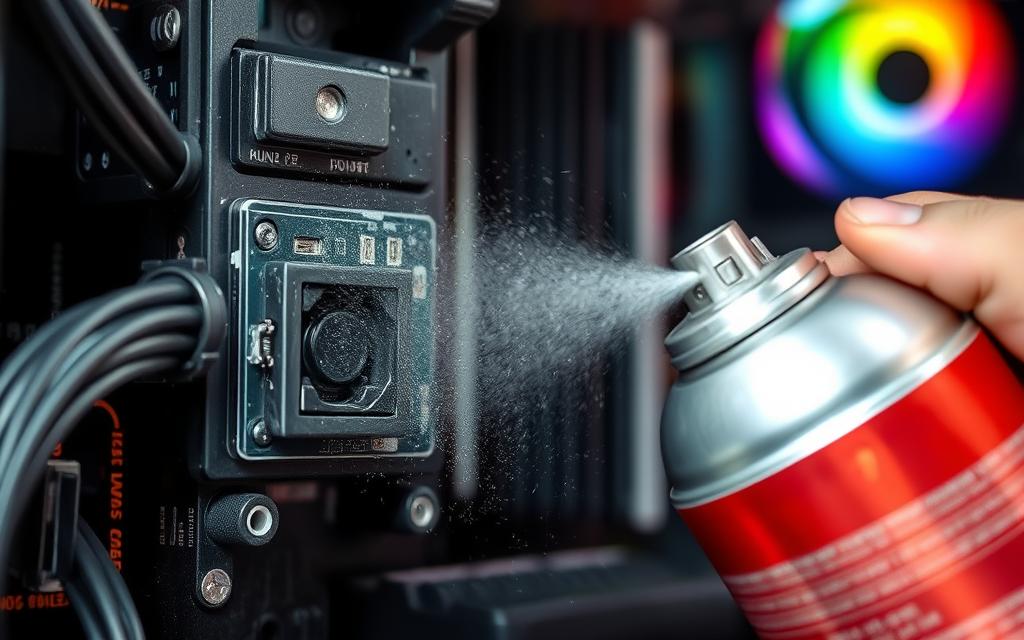
When to Seek Professional Help
Computer maintenance often needs an expert eye, especially when looking at your device’s ports. Knowing when to call for help can save you time, money, and avoid annoyance. Think about several factors related to your computer’s performance and accessibility to decide on professional cleaning.
Evaluating the Need for Expert Cleaning
If you see a lot of dust, debris, or signs of liquid damage, it’s time for professional help. Connection issues or problems with external devices might mean your ports need more than just a basic clean. Sometimes, internal parts are hard to reach, making it risky to try cleaning by yourself. Getting help from experts minimises the risk of damage and ensures careful cleaning.
What Professionals Can Offer
Expert cleaning does more than just get rid of dirt. Professionals assess damage and may uncover hidden issues, which can make your device last longer. They know advanced cleaning and repair techniques that might not be obvious to you. Choosing professional cleaning means better performance and less risk of future problems for your computer. By trusting professionals, you ensure a complete service that not only fixes issues but also protects your investment.
Conclusion
Cleaning computer ports is crucial for keep your devices working well. With routine care, you reduce the risk of problems from dust build-up. Clean ports are key for gadgets to work at their best. This is especially true for ports like USB-C that we use a lot.
Use the right cleaning methods, like compressed air and isopropyl alcohol with over 90% purity. Avoid metal tools that could harm your ports. Make sure they’re completely dry before plugging anything back in. Check out this resource for more on port functions and their importance.
If cleaning doesn’t fix the issues, it might be time to see an expert. Regular cleaning improves the reliability and performance of your tech. It helps your devices last longer and work better.
FAQ
Why is it important to keep my computer ports clean?
Keeping computer ports clean is vital. Dust and debris can block connections, making devices unstable. This might lead to damage and inefficiency.
How often should I clean my computer ports?
You should clean your computer ports regularly, ideally every couple of months. Clean them more often if they seem dirty or if you’re having trouble connecting your devices.
What materials do I need for cleaning computer ports effectively?
To clean computer ports effectively, you’ll need compressed air, cotton swabs, soft cloths, and isopropyl alcohol. These help remove dust and disinfect without causing harm.
Can I use water to clean my computer ports?
No, don’t use water to clean computer ports. It could damage your device. Use dry methods and isopropyl alcohol instead. It evaporates quickly, reducing damage risk.
What symptoms indicate that my ports need cleaning?
If you see dirt, struggle to connect cables, or if devices power off, clean your ports. These signs mean cleaning is overdue to prevent damage.
How do I use compressed air to clean my ports?
To clean ports with compressed air, angle the nozzle slightly. Use short air bursts. This avoids pushing debris further in and avoids harming the device.
When should I seek professional help for cleaning my computer ports?
If self-cleaning doesn’t fix the problems, or if damage looks bad, get professional help. Experts can clean and repair without causing more damage.
Can dirty ports affect the performance of my devices?
Yes, dirty ports can cause devices to malfunction. Issues like unstable connections and data transfer failures can harm your technology’s performance and efficiency.
What types of computer ports are commonly found?
Common computer ports include USB, HDMI, audio jacks, Ethernet, and VGA ports. Each one helps connect different devices to computers, serving various functions.

